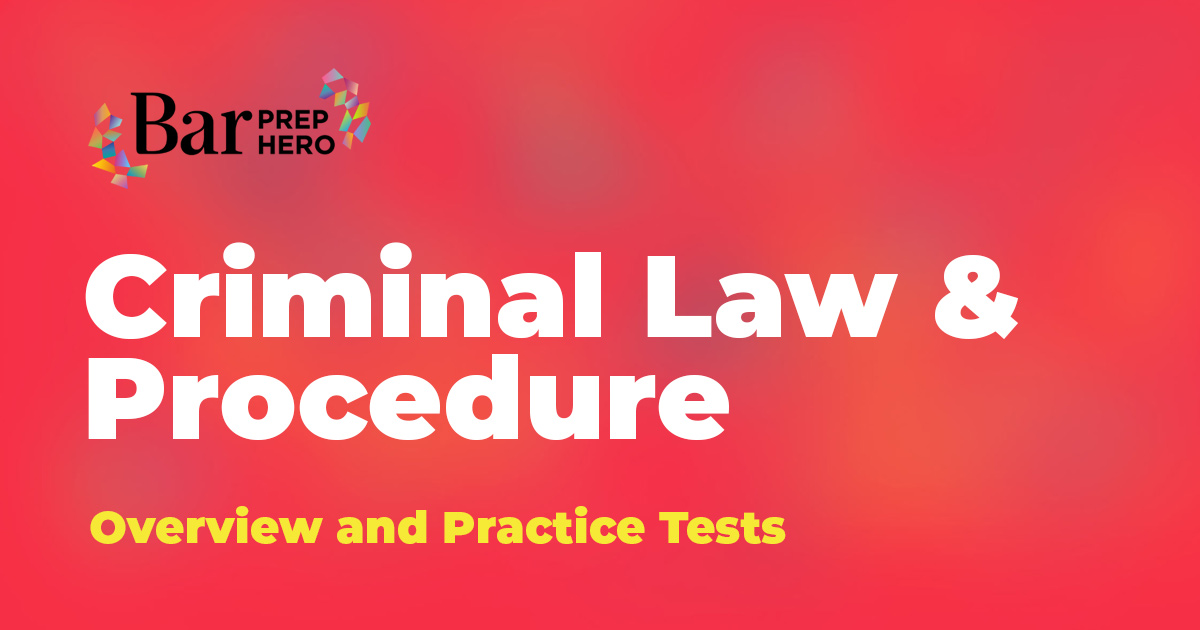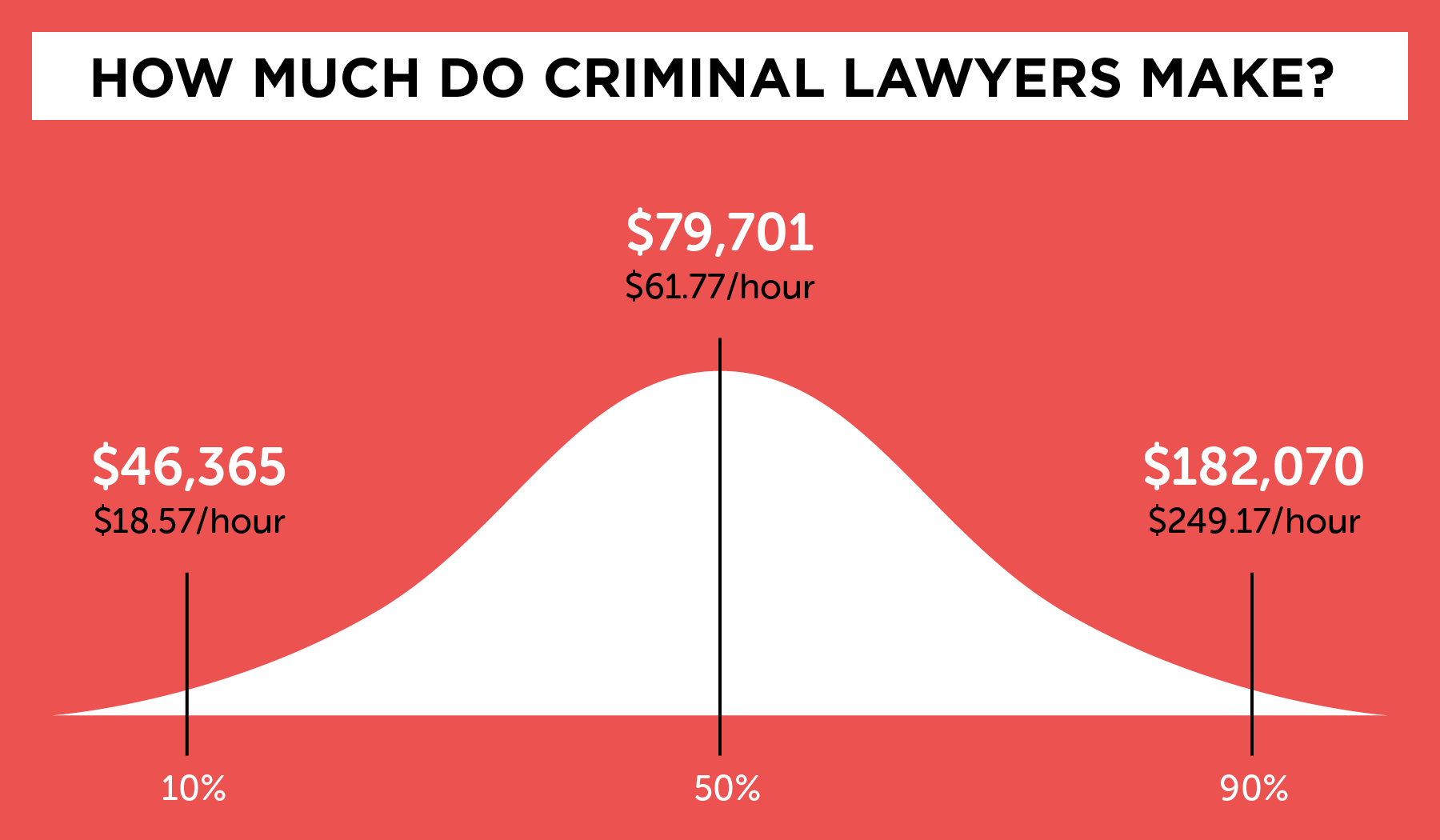Criminal Law & Procedure
Overview and Practice Tests
 By Andrei Zakhareuski, BarPrepHero, Founder/CEO
By Andrei Zakhareuski, BarPrepHero, Founder/CEO
More help for you
What is Criminal Law & Procedure?
Criminal law and procedure is a branch of law that handles crime and how individuals that commit crimes are prosecuted. This area of law focuses on an individual and whether or not to punish them for an act or an omission that is in violation of a law. These acts or omissions are crimes because they are perceived as socially harmful or threatening. The result is court processing of these criminal cases through a set of rules. The rules that criminal cases follow in the legal system is criminal procedure.
Start Preparing for Your Bar Exam Now
Criminal Procedure
Most criminal cases will adhere to the following common stages: arrest, plea bargain or criminal trial, and sentencing. Criminal cases often result in a criminal defendant accepting a plea bargain in lieu of going through a criminal trial.
Arrest
The very first step in the prosecution of a criminal often starts with law enforcement making an arrest. A police officer can make a valid arrest when they observe someone committing a crime or if the officer has probable cause to believe that the person has committed a crime. The police can also make an arrest authorized with a valid arrest warrant obtained by a judge after a finding of probable cause. The suspect then goes through the booking process, where they are fingerprinted and photographed, and is then placed into custody.
Criminal Trial
In a criminal trial, there are several different phases that lead up to the defendant being sentenced, which is the next stage. These phases include indictment, jury selection, opening statements, witness testimonies, cross-examination, closing arguments, jury instructions, jury deliberation, then the verdict of guilty or not guilty. Many cases end in a plea bargain instead of going to trial as a result of pretrial negotiations between the criminal defense attorney and the prosecutor. The criminal trial stages occur as follows:
- Indictment. After a defendant is arrested but before the criminal trial starts, a defendant is brought before a judge or grand jury and read the charges against. The defendant is asked to enter a plea of guilty or not guilty. At this point, the defendant may enter a guilty plea pursuant to a plea deal. If the defendant enters a plea of not guilty, the case will proceed to trial and jury selection will begin.
- Jury selection. During jury selection, each side will begin the process of picking the jury from a potential juror pool (usually a group of people called for jury duty). Each side will ask questions to the potential jurors to determine their competency to serve as a juror and may exercise certain “challenges” to excuse certain jurors. After this process is done, the selected jurors are sworn in as the jury for the criminal case.
- Opening statements. Opening statements are statements given by each side in a criminal trial before they begin the presentation of their case. Generally, the prosecution delivers their opening statements first, followed by the defense. Each side will present to the jury their overall case strategy and the evidence expected to be presented. They will conclude with the conclusion they hope their case will show to the jury.
- Witness testimonies. Each case is allowed to present witnesses to help present their case. There are lay witnesses, who are people who saw certain events and describes to the jury what he or she saw. An expert witness is a specialist in a field who testifies as to their expert opinion on their specialty area in the case (e.g., forensic specialists). Expert witnesses must be approved by the court before the case goes to trial. Finally, there are character witnesses. These are witnesses who testify about the character of the defendant, victim, or other person from their personal experience with or knowledge of the victim. Character witnesses are often used to attempt to discredit someone or to show good character for a defendant.
- Cross-examination. After the prosecution or the defense calls someone to testify, the other side has the opportunity to cross-examine them. This involves asking questions about the witness’s testimony, background related to the case, or any sort of bias, among other questions. The purpose is to try and get the witness to say something that is helpful to the cross-examiner’s case, or that will discredit the witness in any way.
- Closing arguments. This is similar to opening statements. Each side addresses the jury with a summary of their case and what conclusion they hope the jury will reach.
- Jury instructions and jury deliberation. The judge reads a set of instructions to the jury regarding what the Rules of Evidence and other necessary information. The jury then deliberates to decide on verdict in the criminal case.
- Verdict. Once the jury has reached a verdict, the verdict will be delivered to the judge, and the jury will read the verdict aloud in open court.
Sentencing
The final stage of the criminal procedure stages is the determination of the appropriate legal punishment for the person who committed the crime. Punishment will be decided by the sentencing judge, and range from fines to incarceration or probation. Factors that affect a criminal sentence include the defendant’s criminal history, the type of crime, whether there is a mandatory minimum sentence, or if there are mitigating or aggravating factors involved in the specific case. If a plea deal is negotiated, the term of probation or incarceration and amount of fines will be predetermined by the plea deal. Any plea deal will have to be signed off on by the defendant and approved by the judge.
How to Become a Lawyer
The journey towards becoming a criminal defense lawyer follows the same steps as the other branches of law. This begins with earning a bachelor’s degree from an accredited university. A degree in a law-related area, such as criminal justice, is recommended, though not required. Once a bachelor’s degree is earned, the next step is to apply to law school. The process of applying to law school requires that an applicant take the LSAT and receive a good score before they are admitted. The next step in the process is to attend law school and earn a law degree, referred to as a Juris Doctorate (J.D.).
While earning a bachelor’s degree and a law degree, it is best to gain as much relevant work experience to get that competitive advantage for the job search ahead. Work experience can be earned through working for local law firms, interning for courts, or participating in student attorney programs while in law school.
After earning a law degree, a series of tests must be taken to acquire a license to practice law. These tests include the Multistate Professional Responsibility Examination (MPRE), which is often taken while still in law school but does not have to be. Another examination that must be passed is the State’s Bar Examination, which can include the Multistate Bar Examination (MBE), Multistate Essay Examination (MEE) or State-Specific Essay Examination, State-Specific Criminal and Procedure Exam, and Multistate Performance Test (MPT).
Passing these tests will allow you to apply for a law license which will kickstart the job searching process towards becoming a criminal defense lawyer. Some firms may require specialized experience, so working in the public sector as a public defender is a common start for this career. Other relevant experience includes working at a criminal defense firm while in law school.
Requirements
- Bachelor’s degree
- Law degree – Juris Doctorate (J.D.)
- State Law License
- Specialized experience
Job Description and Duties
The primary role of a criminal defense lawyer is to represent defendants that have been accused of committing a crime. Their main duty is to earn the freedom of their defendant, or to negotiate a plea bargain or settlement with lower charges or a more lenient sentence. Criminal lawyers can work at all levels, which include federal, state, and local. To represent their clients, criminal defense lawyers need to conduct research, devise strategies, interpret laws, present evidence, and negotiate on their client’s behalf.
Salary Information and Employment Outlook
The average salary for a criminal defense lawyer in the United States is $79,701, with salaries ranging from about $46,000 to $182,000. According to the U.S. Bureau of Labor Statistics (BLS), the projected job growth for lawyers from 2016-2026 is 8%.

There are multiple paths that one can pursue as a criminal defense attorney. Criminal defense attorneys can work as a court-appointed defense attorney, where the court will appoint them clients to defend, or in a private or nonprofit law firm setting. Many criminal defense attorneys also open their own practice. Many prosecutors use their knowledge of the legal system to transition over to practicing criminal defense.. When it comes to a career in a law firm, competition is stiff, due to the high rewards of working with a reputable law firm. This is why it is recommended to do well in law school and get as much relevant work experience as possible before venturing out into the criminal law world.
If you are in the midst of preparing for your bar exam, we’ve got you covered. We have free MBE practice tests to prepare you for exam day. If you are looking to pass you bar exam guaranteed, be sure to check out our premium program.

